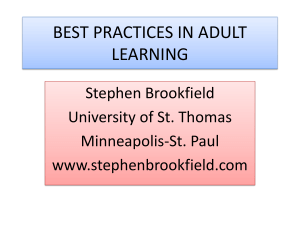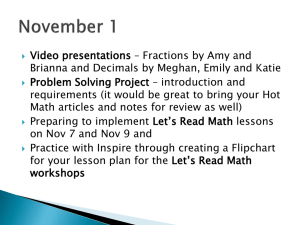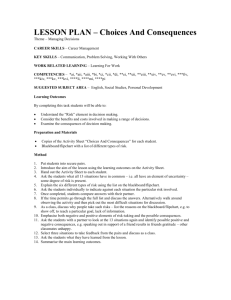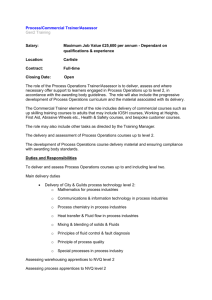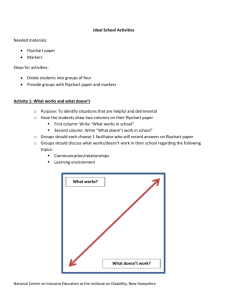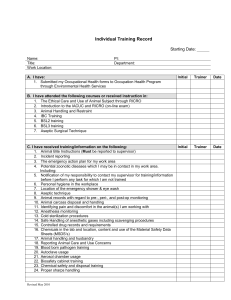Resource 1
advertisement
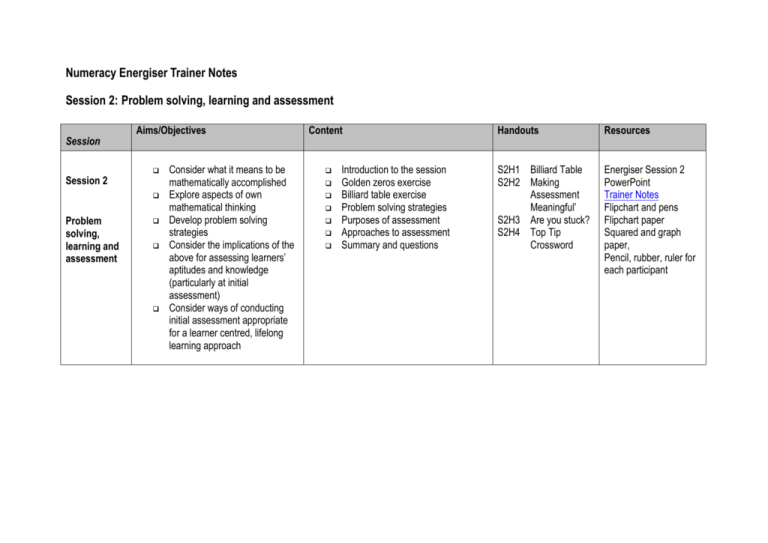
Numeracy Energiser Trainer Notes Session 2: Problem solving, learning and assessment Session Session 2 Aims/Objectives Problem solving, learning and assessment Consider what it means to be mathematically accomplished Explore aspects of own mathematical thinking Develop problem solving strategies Consider the implications of the above for assessing learners’ aptitudes and knowledge (particularly at initial assessment) Consider ways of conducting initial assessment appropriate for a learner centred, lifelong learning approach Content Introduction to the session Golden zeros exercise Billiard table exercise Problem solving strategies Purposes of assessment Approaches to assessment Summary and questions Handouts Resources S2H1 Billiard Table S2H2 Making Assessment Meaningful’ S2H3 Are you stuck? S2H4 Top Tip Crossword Energiser Session 2 PowerPoint Trainer Notes Flipchart and pens Flipchart paper Squared and graph paper, Pencil, rubber, ruler for each participant Trainer Notes Session 2 120 minutes Problem solving, learning and assessment Outcomes By the end of this activity, participants will have: explored their own mathematical thinking and their problem solving strategies considered the purposes of assessment and a variety of methods for assessing learners’ knowledge, skills and understanding. Whole group Yourself as a Problem Solver 85 minutes Introduction (5 min) S2PP 1 - 2 The exercises will encourage you to reflect on yourself as a problem solver and investigator. You don’t need to be a mathematician. Concentrate on how you tackle the exercises rather than on getting the answer. Being stuck is part of the process in problem solving. Golden Zeros energiser Work individually (5min) Share methods and progress in pairs (5min) PP 3 Whole group (10 min) Volunteers to demonstrate their methods on flipchart One method on PowerPoint if not already covered Further questions? PP 4 PP 5 Pairs (5 min) Discuss your feelings and your perception of other people’s feelings PP 2 Whole group (20 min) Learning points from the activity? different methods get to the same answer persistence required false trails are part of the process collaboration may or may not be helpful for individuals emotional response can be strong – positive and negative Mathematical Behaviours Session 2 Trainer notes PP 6 S2H1 Billiard Investigation PP 7 Introduction (5 min) This is an investigation with no clear answers What kind of things might you investigate? S2H2 Small group and individual (25 min) You have 25 minutes - take a break when you need to. Work individually or with others to start with Share your findings and compare work Whole group (15 min) What questions did you ask in exploring this task? What mathematical behaviours did you exhibit? What emotional responses did you have? What would learners gain from this kind of task? Summary PowerPoint and points from discussion Whole group Making Assessment Meaningful PP 2 & 6 35 minutes Introduction (5min) PP 8 - 13 Assessment is a crucial part of learning and happens at all stages of learning: as part of negotiating a learning plan as part of learning and teaching to provide feedback for both tutor and learner at the end of a programme of learning to recognise what learning has taken place. S2H3 Fours (15 min) Flipchart a variety of ways of learning about your learners. Refer to S2H3 as a prompt to the kind of things you may wish to assess or make your own list to correspond with the learners you are working with. For each item on your list suggest an assessment method or activity. Whole group (15 min) Points may include: find out about mathematical behaviour as well as calculation skills use investigations and problem solving as well as checklists and multiple choice self assessment by learner discussion and worksheets group as well as individual activities S2H4 Summary ‘Assessment should be challenging for learners, involve creativity, strategic thinking and problem – solving,’ Adult Literacy and Numeracy Curriculum Framework for Scotland, p 23. Refer to Pages 21 24 on assessment in the Currriculum Framework for own reading. Questions and Close Session 2 Trainer notes Session 2 PPS Resources Energiser Session 2 PowerPoint Computer and data projector Flipchart, pens, blutak Selection of unibricks on each table Graph and squared paper Pencil, rubber, ruler and calculator for each participant Adult Literacy and Numeracy Curriculum Framework for Scotland Session 2 Handouts S2H1 S2H2 S2H3 S2H4 Are you stuck? The Billiard Table Investigation Making Assessment Meaningful Top Tip Crossword Session 2 Trainer notes
